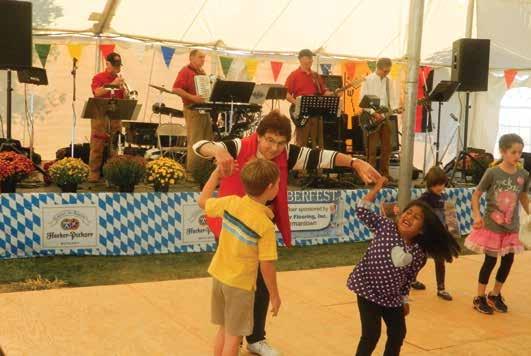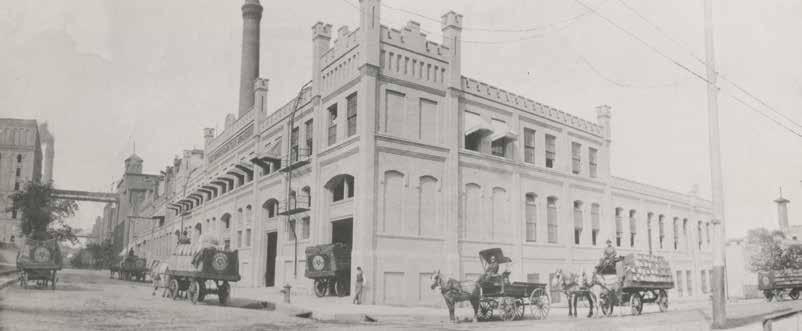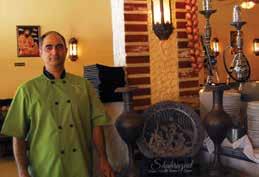
9 minute read
Mark Denning Speaks Out on Behalf of Native Americans
By Erin Bloodgood
“For much of America, Milwaukee included, Native people are invisible. We are here and we exist,” states Mark Denning, who is an educator and community organizer of Native descent. To this day, Native people are still left out of the equation in American society. That becomes obvious when looking at the minimal amount of research studies and newspaper articles written about them. But Denning and his community refuse to let their voices be overshadowed. They are speaking up in the ways they know how—through fire ceremonies and shared offerings.
For four days and four nights, a fire burned in Milwaukee, surrounded by people of all ethnicities and backgrounds who shared their experiences with one another. The reoccurring event, called the Unity Fire MKE, was hosted at the Wgema Campus from Thursday, July 30, to Sunday, August 2, and was sponsored by an array of tribal organizations. The ritual is commonplace in Native culture, used as a way to offer support to community members and to thank the spirits for their generosity. Especially during the pandemic, it is a way of offering emotional support to those who are secluded at home, often elders. The practice ties into Native culture that values family and communal gatherings, Denning explains, rather than the broader American culture that celebrates the individual.
The ritual of the fire gathering is a way to “understand that ‘we’ perspective of community support and love and people knowing each other and looking out for each other,” says Denning. But that culture of closeness and large gatherings can be dangerous during a pandemic, he warns. “That very strength could be one of our weaknesses.” That is why the Unity Fire is even more important during these challenging times. The organizers of the event are showing their community that these healing fires can be practiced using social distancing. There are safe ways to practice their culture so that tribal members with no internet or phone service don’t have to be left out.
Fires and powwows happen regularly in tribal sovereignties, but the Unity Fire is meant to open that custom to people outside their circles. As the fire burned for days in the Concordia neighborhood, nearby residents began to notice and respectfully turn down their music. Milwau- keeans of all colors joined the gathering to share their emotions, struggles and con- cerns. Participants would share, and then the organizers would hold press conferences so that city leaders could hear the con- cerns of their residents. “When we say we want to hear from the community, we’re going four days for 24 hours,” says Denning. “That’s an entirely different mind- set than the public servants that are elected into positions that are sup- posed to [represent] us.”
The most important part of the fire, which people should understand, is the act of listening. “It’s not just listening, it’s active listening. It’s actively engaging with the person,” says Denning. For Na- tive voices to be heard, people outside their communities must dedicate time to listening, understanding and doing research into the ugly history that was not taught in public schools. As Denning explains, there is a heavy cost for being invisible in this country, but his community refuses to be silent. “This is our land, and we are connected to it. We are the land. We are the water, and we have something to say.”
To join the next Unity Fire during the DNC, visit facebook.com/unityfiremke or learn more about Denning’s work at markden- ning.com.
Erin Bloodgood is a Milwaukee photogra- pher and storyteller. Visit bloodgoodfoto. com to see more of her work.

FLOOD THE MARKET WITH MASKS! HOW LOCAL COMPANY, REBEL CONVERTING, STEPPED IN AT A TIME OF CRISIS By Heather Perkins
COVID-19 surprised us all—we weren’t prepared. MaskUpMKE came about because of the drastic shortages of Personal Protective Equipment (PPE). Like many companies, Wisconsin’s Saukville-based Rebel Converting—a manufacturer of hospital-grade disinfectant wipes—couldn’t get enough hand sanitizer, gloves or masks to protect its employees. With a history of community involvement, Rebel Converting took the next step, gave away 3.5 million face masks and became instrumental in MaskUpMKE, a social awareness campaign promoting the use of PPE. Milwaukee entrepreneur and activist Heather Perkins of Ignite Change spoke with Rebel’s owner, Mike Kryshak.
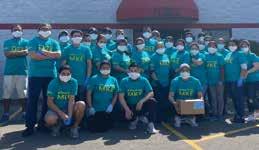
Was Rebel Converting well situated to play a role in the COVID crisis?
The fabric (melt-blown polypropylene, or PP) used in making our disinfectant wipes just happens to be the same fabric they use to make N-95 and surgical masks. Necessity, being the mother of invention, led my son Thaddeus—a recent graduate in mechanical engineering and physics—into designing some masks for our employees from the PP. Knowing that nurses and doctors had to reuse their masks for a few days because of shortages and patients weren’t getting them, there was a need.
We sat down with our group and figured out a way we could make kits so people could make face masks with the fabric pre-cut to the right size and rubber bands with no special tools. We were (and still are) in a pandemic, and we wanted to flood the market with masks and save some lives. That led to our three designs. My wife Loretta laid out some instructions, put out a video asking for volunteers and we set out to donate the material for a
million masks. As soon as this was announced, news crews came, the phone started ringing off the hook with calls from procurement people from major hospital groups, community health centers, police departments, nursing homes—people were coming to our factory.
Allen Edmonds—our favorite shoe company—contacted us as they decided to help in the fight against COVID and transitioned their sewing machines from making shoes to making masks. We met with them and started donating fabric to them. They sewed 260,000 facemasks that went primarily to health care professionals at hospitals.
Did you feel ready for the crisis?
We weren’t remotely prepared. A good friend of mine, film director Bob Purman, who had done a whole bunch of pro-bono work for non-profits, came in and helped us film tutorials to make the masks. He introduced us to you—at Ignite Change. A day later, we were announcing our social media campaign, MaskUpMKE, and we were off.
Did you receive assistance from the medical community?
The Medical College of Wisconsin has made 300,000 masks and has helped triage where the masks should go. They also helped us give out good information on what we could do to slow the spread— handwashing, staying at home, social distancing. We needed to get out the word out—and we made our first Public Service Announcement.
Did community volunteers get on board?
One of the non-profits that I had been working with, Just One More Ministry, kickstarted their volunteers and started making masks and distributing them – to the homeless shelters, inner-city churches, outreach groups... To date, they have made and distributed over a million masks just by themselves. You can see where their masks went on their website.
Soon, we saw that we were going to blow through a million masks—so we ordered up a ton of rubber bands and made kits for another 2.5 million masks. All sorts of groups came to us join us in making and distributing masks: The United Way of Greater Milwaukee & Waukesha County, Zilber Foundation, UniteMKE, Habitat for Humanity, the Greater Milwaukee Foundation, the Milwaukee Bucks and Fiserv Forum (which served as a pick-up and drop-off location for us). North Shore Bank opened up their 33 locations in Southeast Wisconsin for pick up and drop off. Milwaukee Metal Parts made forming plates that they donated to anyone that wanted to make masks. Mexican Fiesta opened Flores Hall for volunteers to make masks.
Many companies helped us out and are listed on our friends’ page with materials and services.
What came next?
Once we had the masks out, we realized it wasn’t going to do us any good unless people started wearing them. Through our social media campaign, mes

sages from our City Health Department and other campaigns, the general public pretty much knew that masks were an effective way of fighting COVID—but we still had misinformation out there that led some people to believe that masks weren’t necessary. Some even believed (and unfortunately still do) that it was harmful or an infringement of one’s rights. Healthy individuals that can’t bring themselves to wear a mask (when they can’t socially distance) should take a good look in the mirror every morning and wonder if they might have killed someone.
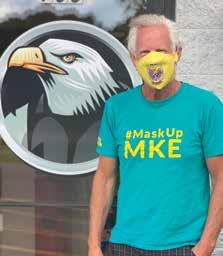
Most of us at MaskUpMKE felt that the only way to get some people to wear a mask was to mandate it—so when legislation came up (from Alderwoman Marina Dimitrijevic), we started a new website,










mandatemasksmke.com, to run ads and do what we could to push the legislation through. When the mandate ads came out and we voiced our support—I have to say I was taken back by the negative feedback (from what I am assuming is a very small but vehemently vocal minority)—some very spooky stuff. I personally couldn’t have been happier with the outcome: The fact that the mandate vote [in the Common Council] was unanimous, and that the mayor signed it right away. I believe it has saved some lives.

You’re not resting on your accomplishments?
Now that the mandate passed—city and state—we still need compliance, and we still need to get the word out. We are continuing to remind people of the importance of masking up. This month, the HOP—our downtown streetcar—is wearing a mask and will have free masks on board for anyone that forget theirs.
It’s a great feeling to see how MaskUpMKE has impacted Milwaukee and the surrounding area. I feel that we, all of our partners and friends, can say we got together and saved some lives.
Next steps?
We still have some areas we need to address—lives that need to be saved. As much as I wish it weren’t true, COVID is far from over. We will need help from individuals, restaurants, taverns, retail establishments and companies that want to join us our next project, Mask Up For Good, to get reusable masks to those in most in need—those who are incarcerated, facing homelessness and the economically disadvantaged.
I love the idea of the Mask On FaceOff contest on the Shepherd Express website! I know it’s not always that easy and fun to be wearing a mask all of the time. The Face-Off is getting people involved—adding personalities, humor, social causes, making a statement—can’t wait to see them.
For more, visit maskupmke.org/ spread-the-word.html. To enter the Mask On Face-Off photo contest, visit shepherdexpress.com.




